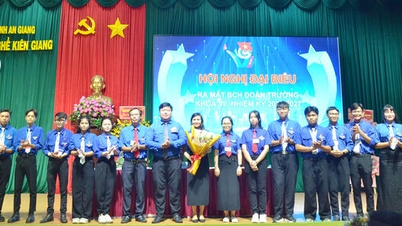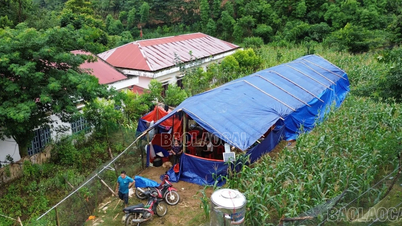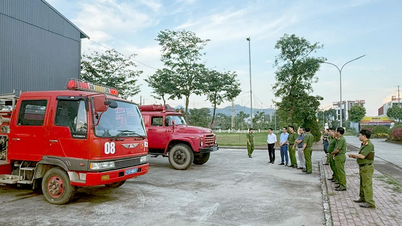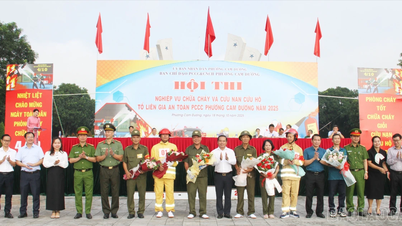Cleaning land data, the right and necessary step
These days, across the country, localities are simultaneously implementing the construction of land databases, a key task in the process of administrative reform and national digital transformation. The goal is to form a centralized, unified, synchronous and multi-purpose land information system, capable of connecting and sharing interconnected data nationwide. This is considered an important step to improve the effectiveness of State management, make the real estate market transparent and facilitate people in all transactions and procedures related to land.
An accurate, unified and updated land data system not only helps the State manage effectively but also serves as a foundation for the formation of an e- Government , serving millions of transactions and procedures each year. When land data is fully digitized, people can perform all related procedures from transfer, registration of changes, tax payment, to issuance and exchange of red books completely online without having to submit manual documents. This not only saves time and costs but also minimizes contact, prevents negativity and harassment.

All red books are currently issued and managed by state agencies, so why do people have to submit photocopies?
For the State, accurate data helps manage planning, grant construction permits, collect taxes, resolve disputes and control the real estate market more effectively. Standardizing land information is also an important tool to prevent acreage errors or unupdated changes.
Therefore, the policy of “cleaning up land records” is completely correct. This is not only a technical activity but also a step to transform management thinking, bringing land administration from manual to modern forms, from paper to electronic data towards a unified national database, making the market transparent.
To implement this policy, since mid-2025, many wards and communes across the country have launched the "90-day campaign to clean up land data" with the requirement that people photocopy their red books, declare information and submit them to the residential group. Some places even announced that if they do not submit on time, "all rights will not be resolved", or "land users will be responsible for any future impacts".
Cleaning up land records is necessary but cannot be done the old way.
However, according to experts, the way data synchronization campaigns are being implemented in many places is going in the wrong direction, the goal is right, but the method is wrong. Instead of taking advantage of technology, many wards and communes require people to photocopy their red books and submit them to the residential group or People's Committee to "clean the data".
Meanwhile, all red books are currently issued and managed by the State agencies themselves, which means that all data has been fully stored in the land management system. Each locality has the original and electronic copy of the red book, along with detailed information about the land user, area, purpose and changes. Requiring people to photocopy the red book themselves to return it to the place that issued it is unreasonable and unscientific .

Illustration photo.
In the context of digital transformation and the national land database being deployed, agencies can completely retrieve, compare and update data directly from the existing system, instead of collecting it manually. "Forcing people to photocopy" not only causes inconvenience and wastes time, but also demonstrates old administrative thinking and lack of technology application. If the available data sources are not taken advantage of, the "record cleaning" campaign risks becoming a formality, wasting effort without bringing about real results.
Lawyer Nguyen Duc Hung, Director of Thien Duyen Law Company Limited, said: “The government already has the data, so why ask the people? If the archived records have not been digitized or are lost, that is the responsibility of the management agency, and the burden cannot be shifted to the people.” He emphasized that the current requirement to submit photocopies of red books is not only against the law but also against the spirit of digital transformation.
“The Government’s Decree 118/2025 clearly stipulates that officials are not allowed to request re-declaration or re-submission of documents and papers already in the national database system. Furthermore, collecting photocopies of red books also poses a great risk to personal information security. Red books contain full names, addresses, areas, plot numbers, property values, and very sensitive data. When photocopied and manually stored at residential groups or committees, the risk of loss, exploitation for fraud or forged transactions is very high,” said lawyer Hung.
Agreeing with this view, lawyer Bui Kim Lien of Sinh Hung Law Firm commented: “The Government has invested thousands of billions of VND to build a national land database and an electronic public service portal. All information about red books, land plots, changes in land use rights, etc. have been digitized and can be communicated between ministries, branches, and localities. Requiring people to submit photocopies of red books is going against the digitization process, is both wasteful, and reduces the prestige of administrative agencies.”
Cleaning up land data is a correct policy, demonstrating the State’s efforts in transparency and modernization of management. But real reform must start from changing the mindset of the implementers, not forcing people to “run to photocopy” to complete a campaign in the name of digitization.
Source: https://baolaocai.vn/vi-sao-lam-sach-du-lieu-dat-dai-lai-bat-dan-di-photo-so-do-post884787.html


![[Photo] Immerse yourself in the colorful musical world of “Secret Garden Live in Vietnam”](https://vphoto.vietnam.vn/thumb/1200x675/vietnam/resource/IMAGE/2025/10/18/1760805978427_ndo_br_thiet-ke-chua-co-ten-41-png.webp)
![[Photo] Closing ceremony of the 18th Congress of Hanoi Party Committee](https://vphoto.vietnam.vn/thumb/1200x675/vietnam/resource/IMAGE/2025/10/17/1760704850107_ndo_br_1-jpg.webp)
![[Photo] General Secretary To Lam attends the 95th Anniversary of the Party Central Office's Traditional Day](https://vphoto.vietnam.vn/thumb/1200x675/vietnam/resource/IMAGE/2025/10/18/1760784671836_a1-bnd-4476-1940-jpg.webp)


![[Photo] Collecting waste, sowing green seeds](https://vphoto.vietnam.vn/thumb/1200x675/vietnam/resource/IMAGE/2025/10/18/1760786475497_ndo_br_1-jpg.webp)






























































































Comment (0)